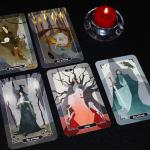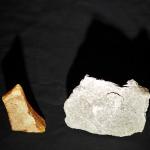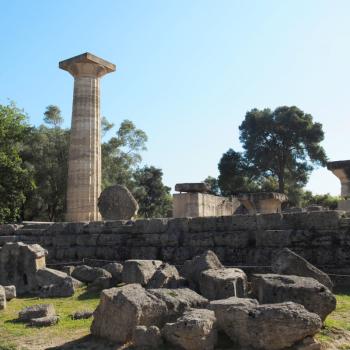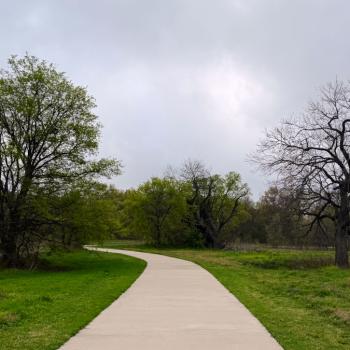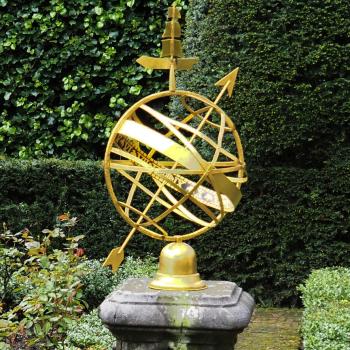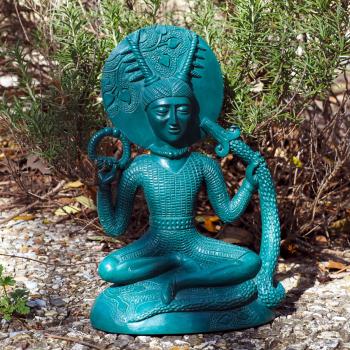An Apostate’s Guide to Witchcraft: Finding Freedom Through Magic
by Moss Matthey
Published by Llewellyn – September 2024
240 pages
Trade paperback: $18.99, Kindle: $14.49
A regular theme on this blog is escaping abusive and controlling religions. It’s not just something I’m interested in – it’s one of the most important accomplishments of my life. When you’re told from birth that the fate of your eternal soul depends on believing certain things – and then on acting in a certain way to prove to everyone you really do believe them – it’s hard to just walk away. It’s necessary, but it’s very, very hard.
I couldn’t have done it alone.
Many of my helpers were authors. First, there were the science writers who explained the evidence for evolution and for the age of the Earth. If the fundamentalists were wrong about how to read Genesis, what else were they wrong about? Plenty, as it turns out. There were the historians, whose work on the origins and development of Christianity showed me that what I had been taught was hardly orthodox and definitely not “apostolic.”
Joseph Campbell was hugely important to me. I discovered The Power of Myth a few weeks after my Pagan epiphany, and while I have since come to understand that Campbell’s humanistic universalizing is an unhelpful oversimplification, his concept of God as a force presented a stark contrast to the jealous and vengeful God of Christian fundamentalism.
My earliest Pagan teachers were all authors: Laurie Cabot, Scott Cunningham, Philip Carr-Gomm, and Ronald Hutton were the most influential on my journey out of fundamentalism and into the Pagan polytheism I practice and love. The most meaningful comments I get on my own books are when someone tells me how they helped them start or continue the process of recovery from toxic religion.
Moss Matthey – survivor and author
And that brings us to the latest in this line of authors who are helping people escape and recover.
Moss Matthey grew up in the Jehovah’s Witnesses. Moss calls them a cult, and while that’s a loaded word that’s often used by Christians to mean “any religion that’s not sufficiently like mine” they certainly match the common definition: insular and controlling. They’re among the most anti-LGBTQ denominations in Christianity – Moss is gay, and started realizing that about the time he hit puberty.
An Apostate’s Guide to Witchcraft is not an autobiography, although there are plenty of personal stories in it. Rather, it’s a condensation of what Moss learned on his journey out of the fear and shame of the Jehovah’s Witnesses and into the freedom and joy of Witchcraft.
And that makes it relevant to anyone who’s trying to get away from childhood indoctrination and find the magic in life.
A broad and inclusive Witchcraft
Want to start an argument? Publish a definition of Witchcraft. Doesn’t matter how you define it, someone will come along and say “I’m a Witch and I don’t believe/think/do this, so you’re wrong.” I do my best to stay out of those arguments. While I have a definition of Witchcraft, if someone who doesn’t meet that definition finds meaning and power in the title, that’s a good thing. Moss states the absolute truth when he says “there are many conflicting ideas about what it means to be a Witch in the modern world, even among Witches themselves.”
Moss begins by rebutting some of the common charges against Witchcraft (including the charge that it’s “just fantasy”), and then describes four “common threads” running through most modern Witchcraft traditions and practitioners: spirituality, community, empowerment, and connection.
This isn’t exactly a definition, but it is a useful description of Witchcraft as it’s actually practiced today. And that makes it a good place to start the book.
His definition of magic is similarly broad: “causing change by spiritual means.” This isn’t a Magic 101 book, but it does have enough introductory material that someone who’s unfamiliar with modern magic and Witchcraft will understand what he’s talking about – and what he isn’t.
The call of the land, the call of magic
I really liked the section “Cult Experiences through a Magical Lens.” Here Moss reinterprets religious experiences he had as a Jehovah’s Witness through the worldview of Witchcraft. I’ve found this to be incredibly helpful in my own journey. The experiences we have are always real – they don’t suddenly become unreal because we change religions. But how we understand those experiences must change to match our new foundational assumptions about the world and the way it works.
I love this story:
Perhaps the most magical thing I notice looking back were the nudges I kept getting to leave the cult… It wasn’t just my German upbringing either. As a child, my family moved to Wales, and I went to a Welsh language school and was raised in the culture. I was the product of two magical worlds, all the while trapped in a cult. But the magic would not leave me lost forever.
This is similar to my own experience of finding the divine in Nature while I was still locked in fundamentalism. I couldn’t understand that then – I just knew I felt protected and at home in the woods. Now I understand that there was something – someone – calling to me. I just had work to do before I could hear that call.
Culture, Community, Spirits, and Nature
As important as leaving an abusive religious environment is, just getting away is only the first step. So while the first part of the book is about building yourself up to leave, the middle of the book is a guide to building a solid practice in Witchcraft. It shows how to fill the void created when you left something harmful with something positive and helpful.
While Christianity is in an overall decline, the contemporary West remains culturally Christian. You will find elements of Christian myth and practice in even the most non-theistic spaces. Fortunately, Witchcraft also has a culture, both ancient and modern. We need not leave holes where the religion we left can seep back in.
The growth of Witchcraft since the 1990s has largely been in solitary practitioners. Still, there is power in community – and online community is also community.
Gods, ancestors, the spirits of the land and the spirits of places, the Fair Folk – all of these are persons with whom we can form and maintain respectful, reciprocal relationships.
Nature is not “fallen” – Nature is good and we are a part of Nature.
This is the core of a healthy, robust, Pagan, Witchcraft practice.
Claiming apostacy
I’ve never used “apostate” or “apostacy” to describe my Paganism. I didn’t leave Christianity so much as I embraced Paganism. But for Moss, claiming the title of “apostate” has great meaning and power.
In his own words:
To the wider world, an apostate is simply someone who has renounced their faith… However, the cult had other ideas. To them, an apostate was the ultimate traitor, a deranged and dangerous individual… To achieve this level of sin you had to do the unthinkable – speak out against the organization. It is a word to demean and discredit whistleblowers, to attack them and avoid taking any kind of responsibility.
One reason this book exists is because I am so dangerous millions of people are forbidden from speaking to me. Merely reading this book could cause them to be kicked out of the faith and shunned.
In any religious, spiritual, or magical transformation, there is power in crossing a line. For Moss, the very title of this book is a magical act.
Who should read this book?
An Apostate’s Guide to Witchcraft is intended first for those who are trying to leave an abusive and controlling religious environment. It will also be helpful for those who have managed to escape such an environment but have yet to find something good to replace the bad they left behind. Moss left the Jehovah’s Witnesses, but it’s equally relevant for those who’ve been abused and oppressed by Protestant fundamentalists; ultraconservative Catholics, Mormons, Jews, and Muslims; and extreme forms of atheism.
But also, it will be very helpful to those who feel a call to Witchcraft and/or Paganism, but who are reluctant to explore it due to the fear of cultural prejudice in any form.
Moss asked me to write an endorsement blurb for this book – I was honored to do so. Here’s what I said:
It’s not enough to walk away from a bad religion. True healing requires finding something good and helpful to replace the void left behind. In this book, Moss Matthey describes his escape from a fundamentalist cult to a path of nature, spirits, and magic – to witchcraft. The empowerment, acceptance, and joy Moss found are available to anyone who will follow the steps in this straightforward and easily accessible guide.
Reviewer’s disclaimer
Llewellyn sent me a PDF of The Apostate’s Guide to Witchcraft so I could write a promotional blurb for it, and then sent me a review copy once it was available. Moss is a friend and a fellow survivor of religious abuse – I hope his book sells well. But if I couldn’t honestly give it a good review, I’d conveniently forget to review it. This is my honest opinion of this book.
One more thing
Be sure to follow Moss on Instagram or on TikTok. His very short videos on modern Witchcraft are quite good, and also hilarious.



